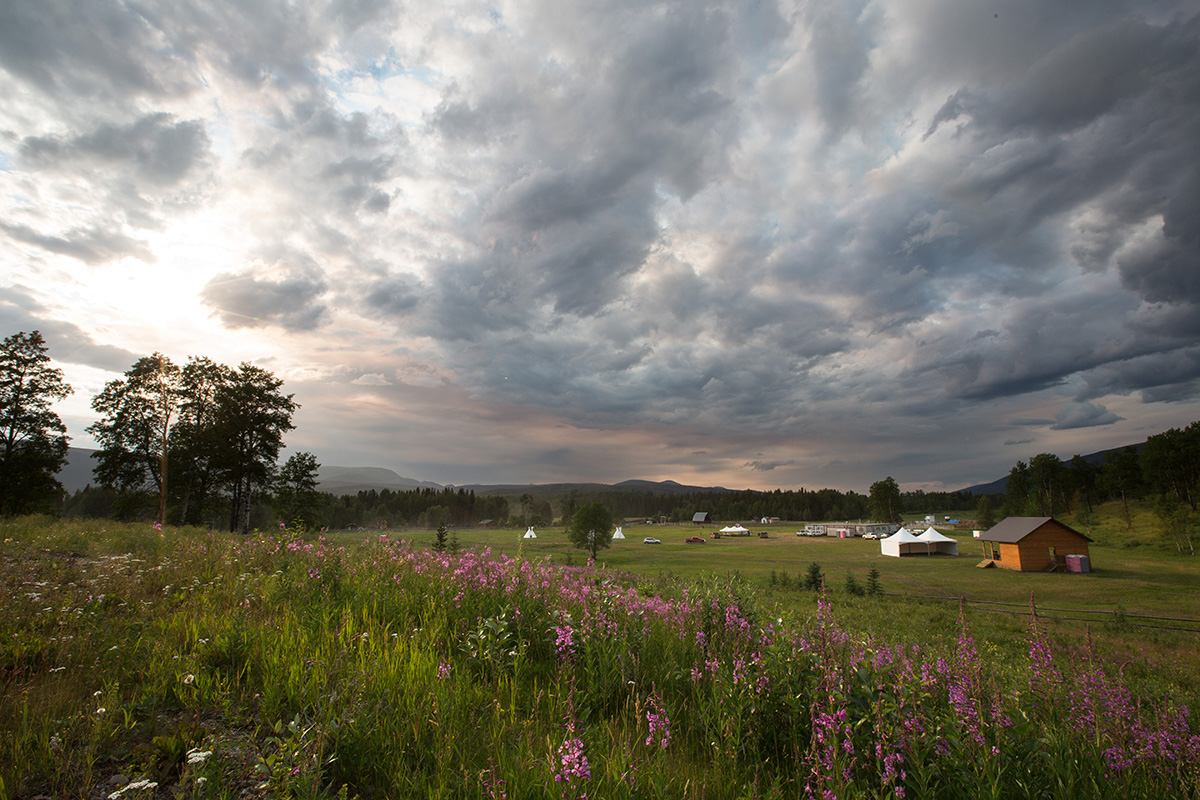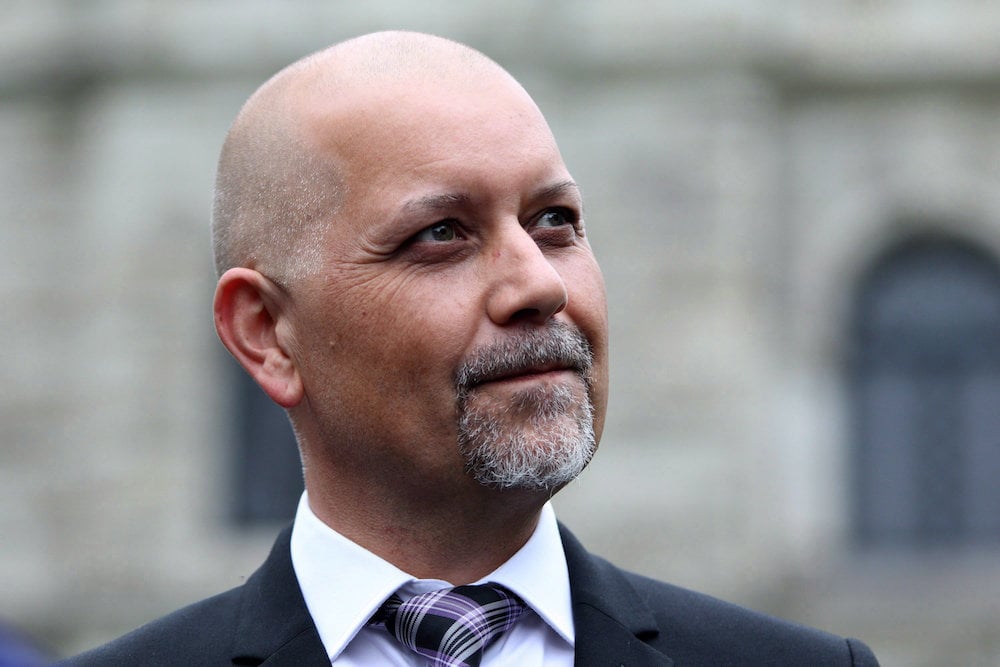A month after losing a major case in the Supreme Court of British Columbia that found the provincial government had breached the Blueberry River First Nations’ treaty rights, Attorney General David Eby has announced the province will not appeal the decision.
“The court was quite clear in their findings of fact about the impacts of cumulative development on Blueberry’s treaty rights,” Eby said in an interview. “We looked at the decision carefully, and on balance we agree with the direction of the court that we’re better to resolve our remaining differences through negotiation than through an appeal or multi-year court process.”
Eby said there’s some risk in not appealing, but it’s the right thing to do. “I think it’s right to understand this decision as a significant milestone in the change to our approach to litigation with nations and the realization of some of the promise of [the United Nations Declaration on the Rights of Indigenous Peoples] of a new relationship.”
For many the shift has been a long time coming, and the ruling that the government had breached the treaty rights of Blueberry River First Nations by allowing and encouraging too much development is only the latest opportunity to redefine the relationship with Indigenous peoples.
Observers had been watching closely for what the government would do following Justice Emily Burke’s June 29 decision in the case, known as Yahey vs. British Columbia.
The decision suggested little had changed in relations between Indigenous nations and the province, despite the 2017 change in government and the 2019 passing of the provincial Declaration on the Rights of Indigenous Peoples Act.
“It’s yet another case, another ruling, this time by the B.C. courts, that continues to add context to the land conflict that’s been going on in Canada and British Columbia since the very beginning,” said Adam Olsen, the BC Green MLA for Saanich North and the Islands, in an interview a few days before the government announced the decision not to appeal the Blueberry decision.
The government wants to be able to say it’s changing its approach to relationships with Indigenous peoples and to the recognition of rights and title, but so far it has fallen short on making that change real, he said.
“They also don’t want to give up the full control that they’ve had over the land and the decisions that are made,” Olsen said. “They don’t want to share, and with that comes huge ramifications.”
Cheryl Casimer, elected to the First Nations Summit Political Executive and a former chief and councillor of the ʔaq'am First Nation, said that while there have been positive shifts in recent years, “it’s still a battle” to get the government to meet the promise of DRIPA, including by involving First Nations in the development of legislation.
“There continues to be a bit of frustration, but I think when it comes to court rulings such as this it lights a fire under their butt,” Casimer said.
“This case is timely in that we’re going to be able to push the provincial government that much harder based on this case,” she said. “They will find themselves in some trouble if they don’t do what the court said they needed to do.”

Blueberry River First Nations are in northeastern B.C. and part of Treaty 8, signed in 1900, which allows governments to “take up” lands for settlement, mining, forestry, trading and other purposes, but also protects Indigenous peoples’ rights to hunt, trap and fish.
Justice Burke found that over many years, the province had allowed industrial development at an extensive scale in Blueberry’s territory without assessing the cumulative impacts of the development and without ensuring people living in the territory could continue to meaningfully exercise their treaty rights.
Following the ruling, the Blueberry River First Nations said the province had long delayed addressing the cumulative effects and impacts of development on treaty rights and had instead actively encouraged aggressive development of the nations’ claim area through its royalty programs and policies.
“We have persistently tried to have the province take seriously the cumulative effects of industrial development on the waters, forests and wildlife in our traditional territory, and our ability to exercise our way of life based on hunting, trapping and fishing,” Chief Marvin Yahey said.
The province continued approving applications and moved issues “down the road” for another process that never actually came to pass, the nations said.
Eby said the government’s decision not to appeal the Blueberry ruling is a good example of the new approach the provincial government is taking.
“In previous years, it might have been a no-brainer to appeal it all the way and have two or three more years of litigation, but I don’t think realistically that out of any appellant court that we would see a significantly different decision and rightfully so,” Eby said.
“This decision and a number of others are very clearly pointing that the province is headed in the right direction with UNDRIP and with trying to change the relationship,” he said. “We need to transition everything that we do including our litigation to respond to this new reality of partnership with First Nations in the province.”
The emphasis on negotiation stands in contrast to Justice Burke’s reasons for judgment, which make clear that the case proceeded because previous efforts over many years to find a solution outside the courts had failed.
As recently as 2018, after the claim had been filed but before the trial began, there was a delay of a year initiated “to allow the parties to pursue mediation and negotiations.” As Burke’s ruling put it, “Unfortunately, those efforts were not successful.”
Vancouver Sun columnist Vaughn Palmer has quoted Blueberry River First Nations saying those talks broke down in 2019 because “the government hit us with a take-it-or-leave it position… to revert to business-as-usual for fast-track approval of extensive, further oil and gas development in our territory.”
At the time there were competing views within the government and between cabinet ministers, but ultimately there was an unwillingness to put any oil and gas development at risk.
Eby said he wasn’t part of the 2019 discussions and couldn’t say what led to the impasse. “The goal of everyone in the... discussions was to avoid litigation if we could, and I think everyone went into it in good faith hoping to avoid litigation and ultimately we weren’t able to do that,” he said.
He said he’s optimistic that following the court’s ruling, the government and Blueberry can find a path forward and that it can provide a template for the rest of the province.
“I think the court decision gives us a map on what we need to do to reach resolution, and it gives us the chance to reset the discussion and the relationship,” Eby said. “Without question this is going to have an impact on not just oil and gas, but also forestry and other resource development in the area.”
Green MLA Olsen said the B.C. government had been ignoring its own laws and court precedents for decades.
“As long as this provincial government tries to run from the true history of settlement in this province and how this has evolved, we are going to be in conflict and we will be far lesser than what we could be, and that’s a real tragedy for me,” he said.
There are positive signs, including the draft action plan developed under DRIPA that the government is currently consulting the public on, Olsen said.
“It will be very interesting to see what the next moves of this government will be,” he said. “Are they going to continue to force Indigenous people to fight for our rights, human rights and title, or are they going to get on with what the action plan says?”
Olsen said one thing the government could have done already is adopt a directive similar to one the federal government put in place in 2019 instructing its lawyers on how to approach civil cases involving Indigenous peoples.
“Had this government really had it in their mind to change the relationship with Indigenous nations, that would have been one of the first things that followed after passing the Declaration on the Rights of Indigenous Peoples Act,” he said.
Under the federal directive, which sets out 20 guidelines for government lawyers, the goals include advancing reconciliation, recognizing rights, upholding the honour of the Crown, and respecting and advancing Indigenous self-determination and self-governance.
“The BC NDP need to take ownership of 100 per cent of the responsibility with how they’re litigating Indigenous nations from 2017 on,” said Olsen.
“Despite the attorney saying the courts are not the right place for this, we continue to end up there and we continue to appeal decisions and continue to use really archaic arguments, very disappointing arguments.”
Eby said the province is working on a directive similar to the federal one and has been meeting with the First Nations Leadership Council about it.
“We have a draft that we’re working on, and I think it would be right to describe the process we’re involved in as a co-drafting exercise,” he said. “I think it will produce something that both sides can be proud of and that will guide us in our evolving relationship with First Nations in the province.”
Having a clear policy in writing would help prevent misunderstandings about arguments the province’s lawyers would be making in court, Eby said.
“I would like to have something that I can point to that shows that we’ve provided clear direction to our lawyers about certain positions, and I know First Nations would like to have a document that they can, when they feel like somebody’s stepped over the line in terms of arguments, draw to government’s attention,” he said.
Casimer said there’s a lot of support for fundamental changes to improve the lives of Indigenous people and address the long-term effects of colonization. That includes supporting First Nations to develop their own land use plans and giving them legal weight, as well as addressing poverty and the lasting harms from the residential school and child welfare systems.
“We’ve got a lot of nice words on paper, and it doesn’t mean anything if it doesn’t get actioned on the ground,” she said. “I know we have a lot of people who support Indigenous issues, and we really need them to let their voices be heard calling on their government, calling on their MLAs, to start doing what’s necessary.” ![]()
Read more: Indigenous, Rights + Justice, BC Politics
















Tyee Commenting Guidelines
Comments that violate guidelines risk being deleted, and violations may result in a temporary or permanent user ban. Maintain the spirit of good conversation to stay in the discussion.
*Please note The Tyee is not a forum for spreading misinformation about COVID-19, denying its existence or minimizing its risk to public health.
Do:
Do not: